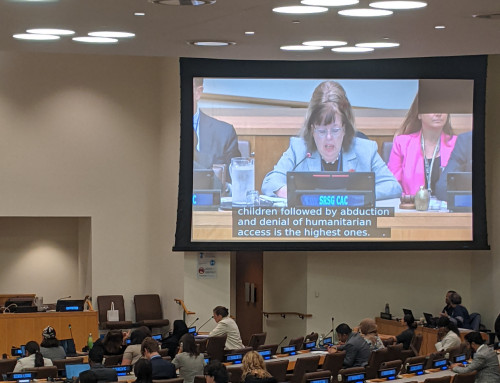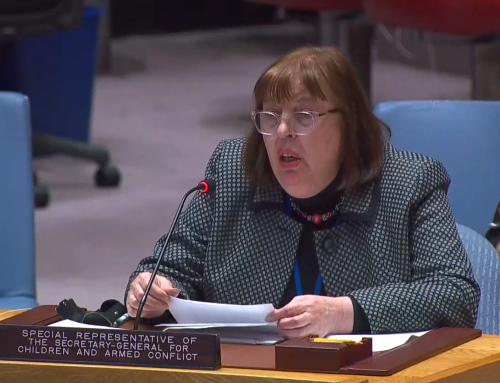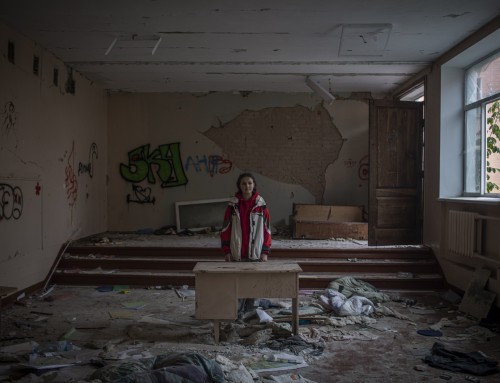Statement at the Event on the Paris Commitments and Paris Principles
***
by
Radhika Coomaraswamy
Under-Secretary-General Special Representative of the Secretary-General for Children and Armed Conflict
***
Monday, 1 October 2007
***
Mme la Ministre, Mme Johnson, Excellencies, Distinguished Delegates, Dear Colleagues,
C’est un grand plaisir d’être avec vous aujourd’hui. Je voudrais remercier le Gouvernement français et l’UNICEF pour leurs efforts incessants qui ont permis de développer, de promouvoir et de mettre en œuvre les engagements et les principes de Paris visant à mettre fin au recrutement et à l’utilisation d’enfants par des forces et groupes armes. Ce sont des instruments clés pour mieux protéger les enfants dans les conflits armés.
The Paris Principles is an important and comprehensive tool, grounded in field realities and the experience of children.
Indeed I would like to emphasize the importance of the many complementary roles we all play in working for better protection of children from armed conflict. I see complementary roles as a special hallmark of the Paris Commitments and Paris Principles – the way they capture the role of Governments, these roles being the commitment of political will, the adoption of laws and policies, implementing services, and even donor strategies. And the way they capture the role of UN agencies, NGOs and other civil society actors in promoting the prevention of recruitment and inclusive, community-based reintegration strategies.
On this occasion of expanding awareness and implementation of the Paris Commitments and Principles, I think it is important to stress that they are about preventing the unlawful recruitment of children and ensuring their sustainable reintegration into families and communities. In this sense the Paris Commitments and Principles acknowledge that our efforts must be more than achieving the release of children who are unlawfully recruited or used by armed groups. We must ensure the most protective environment for children. Here I would again highlight the complementarity of our actions.
As the Government of France, UNICEF and all of us have been so fruitfully engaged, the work we have achieved in recent years through Security Council engagement on this issue focused on promoting compliance with international standards, seeking the accountability of those who perpetrate violations against children, such as unlawful recruitment and use, and facilitating the release of children through action plans and other tools of engagement. The Paris Commitments and Principles add the essential role of addressing program and other interventions. The linkages between these efforts are essential and are what will lead to better protection for children.
I continue to see the value of these complementary actions on the ground. In my recent visit to Côte d’Ivoire, it was a pleasure to see how the roles of different actors – UNOCI, UNICEF, the parties themselves, NGOs and community leaders – have successfully come together to follow up the action plan and achieve the release of children associated with armed groups.
The leadership of the 59 Governments that have signed the Paris Commitments and Principles is essential to further our efforts to translate the impressive body of international laws and standards into reality and justice for children on the ground.
This call for improving action on the ground, this recognition of the multi-faceted way children are affected by conflict and this commitment to improve our interventions is a core message of another complementary initiative. On 17 October, UNICEF and I will be presenting in the General Assembly a 10 year Strategic Review of Graça Machel’s groundbreaking Study on the impact of armed conflict on children. In the spirit of emphasizing the importance of our complementary roles, I want to note that the 10 year Strategic Review process has featured a special inter-agency advisory group of 15 UN entities, the ICRC, and NGO representatives as well as extensive consultations and inputs from Member States, experts and children themselves. We co-convened this strategic review in recognition that while we have much progress to commend in the last decade, much more remains to be done.
In fact the issue of unlawful recruitment and use of children is an area of significant progress in the last decade. Ten years ago the international community was still mired in the negotiations for the Optional Protocol on the involvement of children in armed conflict. Today, over 114 countries have ratified the Optional Protocol and we have witnessed the first prosecutions, both internationally and nationally, of commanders who have recruited and used children in hostilities. Today the Paris Commitments and Principles further the coherence of our efforts to prevent unlawful recruitment and ensure the most effective programme strategies and approaches on the ground.
The adoption of such standards, tools and guidelines is a commendable achievement in 10 years, but I call on you to consider and support the recommendations of our Machel 10 year Strategic Review to help translate such standards and guidelines into reality and justice for children on the ground. As one boy said in the adolescent focus groups for our Machel Strategic Review, “These documents are for diplomatic people, they are just ink on paper”. Let us take it as a challenge to show that they are more thank ink, they can be implemented.
I hope you will see the Machel Strategic Review as an umbrella capturing the lessons and progress, beyond our efforts in the Security Council and to uphold and implement the Paris Commitments and Guidelines. Why? Because war violates all rights of the child. In this way we must remember that impacts of conflict on children such as family separation, death and displacement affect the vulnerability of a child to unlawful recruitment and use by armed groups and the impacts of conflict affect the environment in which we seek to implement sustainable reintegration programs.
In the spirit of our efforts to improve the protection of children in armed conflict, I would like to highlight a few points and recommendations in three areas from the Machel Review:
To end impunity it can not be over-stated that we need to translate the past decade of advances in political engagement, legal instruments and standards into expanded action on the ground. The Machel Review platform of recommendations calls for accelerated national legislative reforms and systematic implementation and monitoring, timely investigation and prosecution crimes against children and targeted measures against individuals and parties. We must strengthen the ability of the ICC and the capacity of the monitoring mechanisms set up under Security Council resolution 1612 to do their work more effectively. Such actions not only hold individuals who have committed heinous crimes but also deter others from engaging in grave violations against children. We need to also invest more, both in terms of political will and capacity building, in the establishment of international juvenile justice standards and guidelines, including the establishment of child friendly mechanisms to promote the participation and protection of children in justice systems, including local, national and transitional justice processes. Whether these processes be courts of justice, truth and reconciliation commissions or home grown process they need to reflect the experience of children. These recommendations are all reflected in the Paris Commitments and Principles.
To ensure child security we need to expand our recognition of the changing characteristics of conflict. The linkage between violence against children and war economies that commercialize and prolong conflict must be better understood and effective action taken to stop abuse and exploitation. Today there are “grey zones” of conflict blurring traditional lines between armed conflict and criminal violence, often involving trans-national crime and arms trafficking. These prey all the more on civilians, with children suffering the brunt of violence, exploitation and deprivation.
To meet the concerns of children and armed conflict we must go beyond holding perpetrators accountable. We need to respond to the survivors of such violence. What needs to be done in terms of programmatic responses to care and protect children also builds on the Paris Commitments and Principles. Just as lessons learned emphasize that successful reintegration requires community based strategies inclusive of all conflict-affected children, the Machel Review stresses that our interventions must emphasize integrated, multi-sectoral basic services, including health, education and support to social services and protection systems. As I have heard throughout my field visits, one girl in the focus groups for the Machel Review said “I was in fifth grade when the war came to my village 10 years ago. Since then, I have not gone back to school” and another girl noted “It is hard to raise a child when you are yourself a child.” The Paris Principles advance guidance emphasizing education and livelihood aspects of sustainable reintegration, but we must also invest more in the related environment of basic services necessary to children’s recovery, reintegration and building peace. We must furthermore take this message of sustained commitment in post conflict settings to the Peace Building Commission.
To achieve better results in the next decade, we also need to strengthen capacity and partnership, including greater investment is national and field level capacity and systems related to monitoring and service delivery.
Improved capacity and partnership must also include child participation. I often speak in these events about how I have learned from my field visits that children are resilient and a source of hope; they are not just victims. We must do more to harness the capacities of children and youth. Indeed we often focus on the potential security threat of adolescents whose lives of have been filled with violence instead of education. Rather we must invest in a positive role for children and youth in building peace. As one girl said in the adolescent focus groups for the Strategic Review, “We are the future and people should be aware of that. Right now we are inheriting a very unstable world.” It is our responsibility, as adults, as governments, as key actors in the international community, to change this environment of children from one of armed conflict to one of protection and to one where there are alternative options and opportunities.
Finally, I would like to share with you the story of Lucy and her remarkable journey from child soldier to young woman with a future. At 12, Lucy was abducted by the LRA in Uganda and sent to combat in Sudan. At 13 she was made the third wife of an LRA commander. She suffered sexual abuse and was regularly beaten by her older co-wives. She considered suicide. Three years later Lucy decided to escape. She managed to convince her rebel husband that a better life awaited them back home. One morning, fearing for their lives, they fled Sudan. Once in Uganda, government soldiers ambushed them. Lucy was captured and her husband, the commander shot dead. She was then taken to a centre for former combatants where she received some counselling and learned that she was pregnant. Four months later, she gave birth to her daughter, Winifred Bianca. She was 16 years old. Meanwhile, Lucy is now a bright and talkative 21-year-old. With help from her mother and her own hard work and determination, she saved enough money to enrol at a Medical College in Kampala. She wants to improve the health of her war-battered nation. Her daughter is now 5 and her grand mother is taking care of her while Lucy studies. 'There is no money to send Winifred to school while I am studying, so she has to wait. I have one more year, then I can get a job and she will go to school,' Lucy said to the person who interviewed her, beaming. 'I want my daughter to have all the opportunities I never had. Her education is very important to me. I think she might be a lawyer.'
Thank you
* * *





